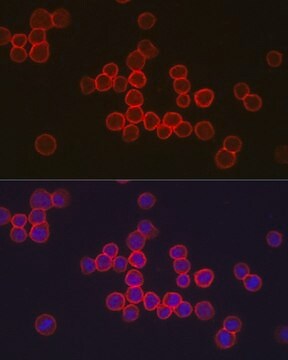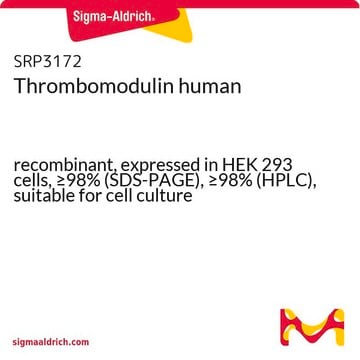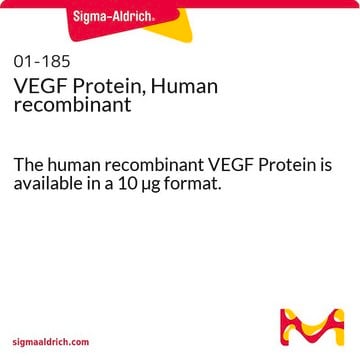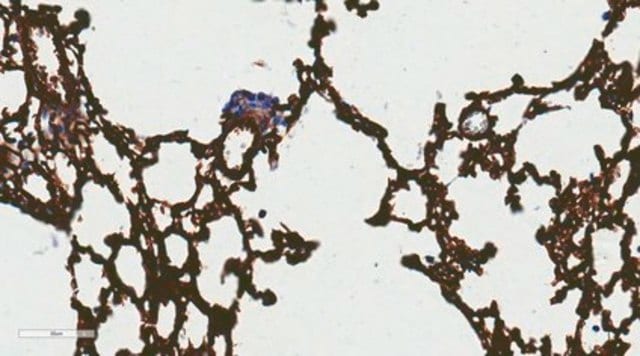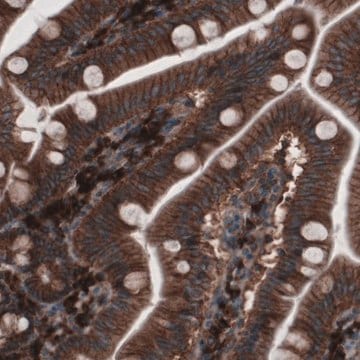MABS1245
Anti-Thrombomodulin Antibody, clone 273-34A
clone 273-34A, from rat
Synonyma:
TM, Thrombomodulin, Fetomodulin, CD141
About This Item
Doporučené produkty
biological source
rat
Quality Level
antibody form
purified antibody
antibody product type
primary antibodies
clone
273-34A, monoclonal
species reactivity
mouse, human
technique(s)
ELISA: suitable
electron microscopy: suitable
immunohistochemistry (formalin-fixed, paraffin-embedded sections): suitable
immunoprecipitation (IP): suitable
isotype
IgG2aκ
NCBI accession no.
UniProt accession no.
shipped in
wet ice
target post-translational modification
unmodified
Gene Information
human ... THBD(7056)
mouse ... Thbd(21824)
General description
Immunogen
Application
Immunoprecipitation Analysis: Representative lots immunoprecipitated the 112 kDa thrombomodulin from normal mouse lung fibroblasts (NMLF), but not Line 1 mouse lung carcinoma cells (Kennel, S.J., et al. (1988). Lab. Invest. 59(5):692-701; Kennel, S.J., et al. (1987). Exp. Mol. Pathol. 47(1):110-124).
Immunohistochemistry Analysis: A representative lot detected upregulated thrombomodulin immunoreactivity associated with the neoepidermis during wound healing using formalin-fixed, paraffin-embedded mouse skin sections (Peterson, J.J., et al. (1999). Am. J. Pathol. 155(5): 1569–1575).
Immunohistochemistry Analysis: Representative lots detected epithelium thrombomodulin immunoreactivity in paraffin-embedded mouse lung sections (Ford, V.A., et al. (1992). J. Biol. Chem. 267(8):5446-5450; Kennel, S.J., et al. (1987). Exp. Mol. Pathol. 47(1):110-124).
Immunohistochemistry Analysis: A representative lot detected thrombomodulin immunoreactivity associated with capillary endothelial cells by fluorescent immunohistochemistry using frozen mouse lung sections (Kennel, S.J., et al. (1987). Exp. Mol. Pathol. 47(1):110-124)
ELISA Analysis: Representative lots were used as the capture antibody for the detection of thrombomodulin in mouse tissue samples by sandwich ELISA using clone 411-201B (Cat. No. MABS1273) as the detection antibody, followed by an HRP-conjugated secondary antibody, or by sandwich radio-immunoassay using 125I-labeled clone 411-201B as the detection antibody (Isermann, B., et al. (2001). Development. 128(6):827-838; Conway, E.M., et al. (1999). Blood. 93(10):3442-3450; Weiler-Guettler, H., et al. (1996). Circ. Res. 78(2):180-187; Ford, V.A., et al. (1992). J. Biol. Chem. 267(8):5446-5450).
Electron Microscopy Analysis: Representative lots detected thrombomodulin immunoreactivity associated with capillary endothelial cells by EM using frozen mouse lung sections (Kennel, S.J., et al. (1988). Lab. Invest. 59(5):692-701; Kennel, S.J., et al. (1987). Exp. Mol. Pathol. 47(1):110-124).
Western Blotting Analysis: A representative lot detected purified thrombomodulin (P112) from normal mouse lung fibroblasts (NMLF) (Kennel, S.J., et al. (1988). Lab. Invest. 59(5):692-701).
Signaling
Signaling Neuroscience
Quality
Immunohistochemistry Analysis: A 1:50 dilution of this antibody detected Thrombomodulin in mouse heart tissue.
Target description
Physical form
Storage and Stability
Other Notes
Disclaimer
Ještě jste nenalezli správný produkt?
Vyzkoušejte náš produkt Nástroj pro výběr produktů.
Storage Class
12 - Non Combustible Liquids
wgk_germany
WGK 2
flash_point_f
Not applicable
flash_point_c
Not applicable
Osvědčení o analýze (COA)
Vyhledejte osvědčení Osvědčení o analýze (COA) zadáním čísla šarže/dávky těchto produktů. Čísla šarže a dávky lze nalézt na štítku produktu za slovy „Lot“ nebo „Batch“.
Již tento produkt vlastníte?
Dokumenty související s produkty, které jste v minulosti zakoupili, byly za účelem usnadnění shromážděny ve vaší Knihovně dokumentů.
Náš tým vědeckých pracovníků má zkušenosti ve všech oblastech výzkumu, včetně přírodních věd, materiálových věd, chemické syntézy, chromatografie, analytiky a mnoha dalších..
Obraťte se na technický servis.